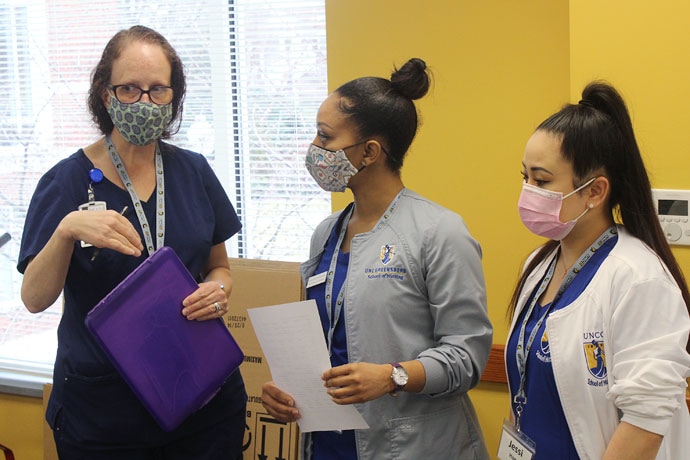As a nurse, Audrey Snyder, PhD, RN, feels compelled to use her knowledge to help those who need her services, wherever they may be. That call for help came recently from nurses in Moldova and Ukraine who are dealing with an onslaught of refugees turning to them for medical care.
Snyder is among a handful of faculty members at the University of North Carolina–Greensboro (UNC-G) School of Nursing who are developing training webinars to teach their East European counterparts such skills as psychological first aid, emergency/trauma care, and nuclear/radiologic treatment.

Dr Audrey Snyder with students.
“For me personally, it’s not only a responsibility but an obligation” to help, Snyder, associate dean for experiential learning and innovation at the nursing school, told Medscape Medical News. “I hope if we were in the same boat that someone would do the same for us.”
The Moldovan nurses are dealing with injuries associated with evacuation and battle-related wounds involving shrapnel and amputation with limited resources, Snyder said. They are also addressing problems with COVID, which are compounded by refugees crowding into tight spaces as stress affects their immune system response, she said.
The nursing school’s relationship with Moldovan healthcare workers dates back to a 2014 North Carolina–Moldova Nurse Collaboration between nursing colleges and health systems in North Carolina and nurses in Moldova. North Carolina has a state partnership with Moldova. The almost 10-year collaboration aims to “elevate the role of nurses in Moldova,” create graduate nursing degree programs there, and provide ongoing support.
The North Carolina groups sent delegations to train nurses in Moldova and vice versa, with healthcare workers from Moldova visiting North Carolina to study health systems and shadow faculty. Since the pandemic began, they have held Zoom webinars on COVID and other topics. The webinars are presented in English, Romanian, and Russian and attract several hundred attendees.
Snyder believes UNC-G is the only school that has helped the nurses since the Russian invasion began. At a meeting before the crisis in early February, Snyder recalls the North Carolina nurses asking their peers abroad about the anticipated invasion of Ukraine. “They did not believe it would happen.”
The afternoon of the invasion, the Moldovan nurses appealed for help. “They already had 12,000 refugees across the border,” Snyder said. All of the Moldovan nurses in the program had refugees in their homes, she added. Refugees who didn’t have the means to travel to other countries to stay with family ended up in churches, gyms, and other centralized refugee centers set up for them, Snyder explained. There are not enough of these centers, so civilians are housing refugees.
“Historically, Moldova is a very small country. It is considered one of the poorest countries in eastern Europe, so they are struggling.” Snyder said most of the foreign aid is going to Ukraine, Poland, and Romania.
The UNC-G nursing faculty, in collaboration with their Moldovan counterparts, determined the training needs and located the right professionals to lead the sessions. They’ve been held about twice a week. The first seminar was attended by the maximum 500 participants.
The program is being expanded with prerecorded webinars with links that can be shared through the Nurses Association of the Republic of Moldova to nurses in Moldova and anyone that can access it in the Ukraine.
In addition to the training, the nursing collaborative is working with state officials to provide supplies that have been depleted during the COVID pandemic to the nurses in Moldova, Snyder said.
“Everyone is very stressed,” she said of the Moldovan nurses. “They are committed to their country and the refugees, and they want to do the best job they can. We feel we have the responsibility to do what we can to be supportive.”
For more news, follow Medscape on Facebook, Twitter, Instagram, and YouTube.
Source: Read Full Article